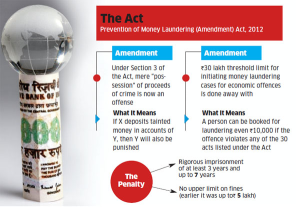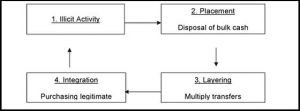Supreme Court upholds PMLA
Why In News ?

Prevention Of Money Laundering Act 2002
- PMLA was enacted in 2002 and came into force in 2005.
- Act enables government authorities to confiscate property and / or assets earned from illegal sources.
- It has been amended thrice- 2009,2012 and 2019.
- The schedule to the act enlists all the offences , assets associated with which can be attached under PMLA and are considered ‘Proceeds of crime’.
Judgement Explained
- SC ruled on a batch of 242 petitions regarding several sections of the act.
- Bench of justices AM Khanwilkar, Dinesh Maheshwari and C T Ravikumar upheld the provisions.
- The question whether some of the provisions could have been brought via Finance Act was referred to a larger 7 judge bench.
- Sections in Question
Section 3
What Supreme Court Said :
- “Section 3 of the 2002 Act has a wider reach and captures every process and activity, direct or indirect, in dealing with the proceeds of crime and is not limited to the happening of the final act of integration of tainted property in the formal economy.”
- The process or activity can be in any form — be it one of concealment, possession, acquisition, use of proceeds of crime as much as projecting it as untainted property or claiming it to be so.


- Sections in Question
Section 5 – Attachment of property involved in money laundering
What Supreme Court Said :
- The bench upheld the ED’s power under Section 5 of the Act to order provisional attachment of any proceeds of crime.
- “It provides for a balancing arrangement to secure the interests of the person as also ensures that the proceeds of crime remain available to be dealt with in the manner provided by the 2002 Act”
Section 24 – Burden of Proof
What Supreme Court Said :
- It approved the validity of Section 24 which puts the onus on the accused to prove that the proceeds of crime are untainted property. The judgment said this “has reasonable nexus with the purposes and objects sought to be achieved by the 2002 Act and cannot be regarded as manifestly arbitrary or unconstitutional”.
Section 45 – Condition of bail
- Put two pre conditions for granting bail
- Supreme Court upheld these provisions as well
- In 2017 Nikesh Tarachand Case, 2 judge SC bench had declared this twin test as unconstitutional
Section 50 – Powers of authorities and statements given to ED officers as evidence
What Supreme Court said :
- It rejected the argument that ED authorities are police officers and, hence, a statement recorded by them under Section 50 of the Act would be hit by Article 20(3) of the Constitution which says no person accused of an offence shall be compelled to be a witness against himself.
The Court also said an Enforcement Case Information Report (ECIR) cannot be equated with an FIR, that supplying an ECIR in every case to the person concerned is not mandatory and “it is enough if ED, at the time of arrest, discloses the grounds of such arrest”.

